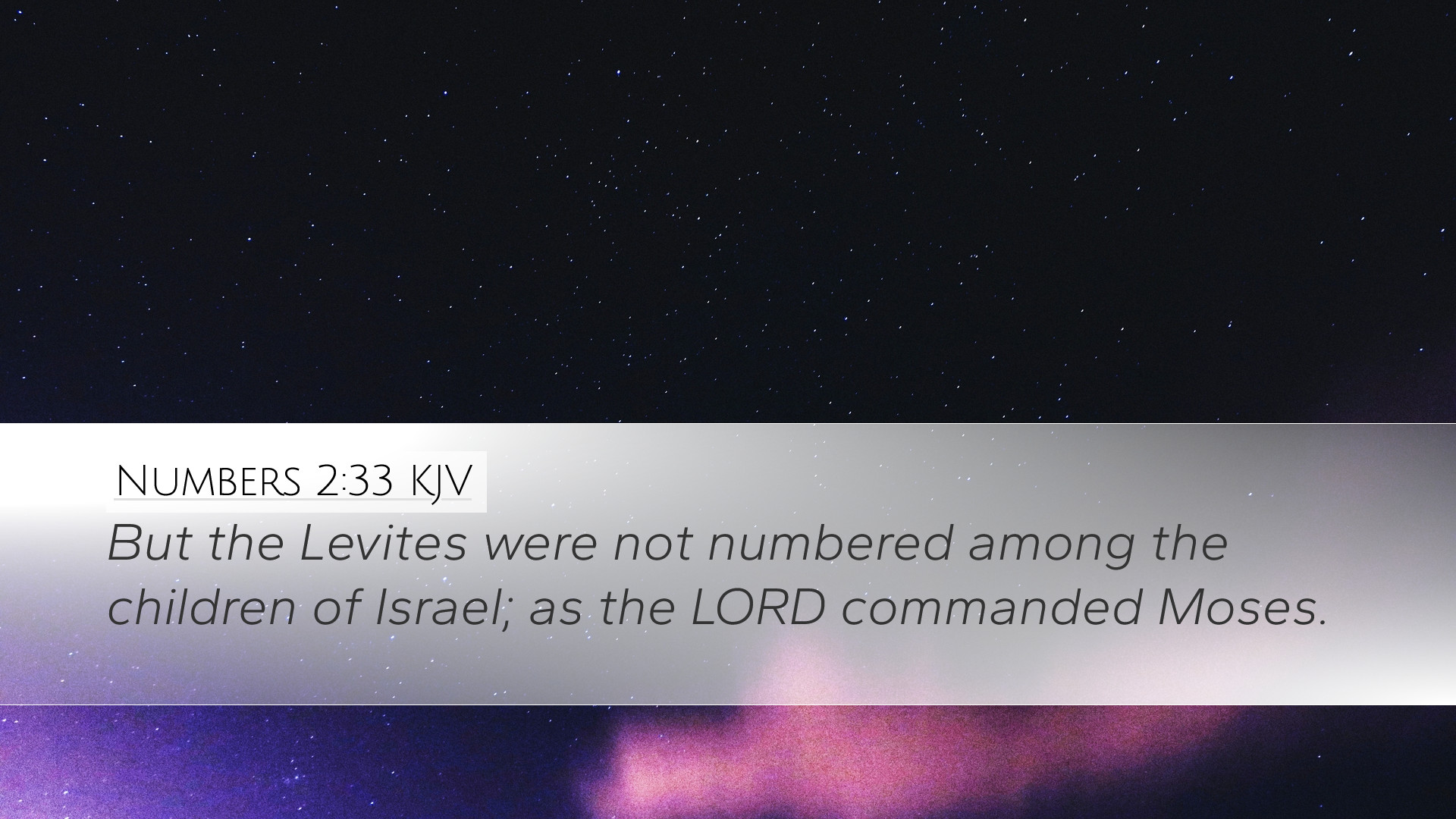Commentary on Numbers 2:33
Numbers 2:33 states: "But the Levites were not numbered among the children of Israel; as the LORD commanded Moses." This verse is pivotal in understanding the unique role of the Levites in the community of Israel. Here, we provide a combined commentary from renowned public domain scholars, elaborating on the context, implications, and theological significance of this verse.
1. Contextual Overview
The Book of Numbers details the organization and structure of the Israelite camp as they journeyed through the wilderness. In this particular chapter, God commands Moses to take a census of the tribes, a significant task to establish order within the community. The Levites, however, are distinctly excluded from this numbering process.
1.1 Historical Background
Tracing back to Exodus, God chose the Levites for a special purpose; they were set apart for sacred duties. This sacredness is further emphasized in the Census, highlighting their unique role compared to the other tribes.
1.2 Purpose of the Census
The census served multiple purposes, including military organization and logistics. By acknowledging the Levites' exclusion, we see God’s specific intentions for them, representing a spiritual rather than a militant role.
2. Theological Significance
This verse encapsulates key theological themes including:
- Separation for Service: The Levites symbolize a life dedicated to the service of God. Their exclusion from the census indicates a separation that holds profound implications on how believers perceive roles within the Church today.
- The Priesthood of Believers: The Levites are often seen as archetypes of the priesthood, foreshadowing the New Testament teaching that all believers are called to be a royal priesthood (1 Peter 2:9).
- Divine Calling: The Levites' designation emphasizes that service to God is a divine calling, not merely a social role, reinforcing God's sovereignty in appointments.
3. Insights from Commentaries
3.1 Matthew Henry
Henry emphasizes the distinction of the Levites, arguing that their exemption from warfare and census was indicative of their holy function. He notes that while others would be counted for military purposes, the Levites were to focus solely on worship and religious duties. He highlights, “The Levites were to be counted by their number, but in another manner; in a spiritual sense, by the amount of service they offered to God.” This perspective encourages contemporary believers to see their roles in light of sacred duty rather than earthly metrics of value.
3.2 Albert Barnes
Barnes discusses the concept of the Levites as set apart for God's work. He argues that by not numbering them, God demonstrated that their value and function transcended numerical representation. He states, “The occupation of the Levites was holy work, and they were, therefore, exempted from the number which reckoned only military might and social status.” This commentary urges scholars and pastors to evaluate their understanding of service and duty in God's kingdom.
3.3 Adam Clarke
Clarke provides a detailed insight into the Levitical duties and their significance in maintaining the worship of God. He notes that the Levites were dedicated to the tabernacle service and that this unique position equipped them with responsibilities that were integral to the spiritual health of the nation. Clarke elaborates, “The Levites represent a class of individuals who are called not just to serve within the church but to be the spiritual backbone, continually offering prayers and sacrifices on behalf of the people.” This perspective illuminates the modern Church's need for dedicated individuals who prioritize God's work.
4. Practical Applications
The truths encapsulated in Numbers 2:33 provide abundant applications for today’s Church, including:
- Emphasizing Spiritual Roles: This verse motivates congregations to recognize and honor those serving in spiritual capacities, much like the Levites, as vital members of the community's health.
- Valuing the Sacred in Daily Life: The Levites teach that everyday living can be sacred if dedicated to God’s service, encouraging believers to offer every aspect of their lives in worship.
- Understanding Church Structure: This scripture offers a foundation for discussions regarding roles within the Church, highlighting the necessity of a clear understanding of divine calling.
5. Conclusion
Numbers 2:33 provides profound insights into God’s plan for His people, particularly emphasizing the importance of the Levites' distinctive role. Through the combined insights of Henry, Barnes, and Clarke, we glean an understanding that encourages a reassessment of what it means to be dedicated to God's holy service. As we reflect on this verse, we are called to honor and uphold those who serve in spiritual capacities, recognizing the divine purpose behind their calling, which ultimately contributes to the vitality of the Church.


